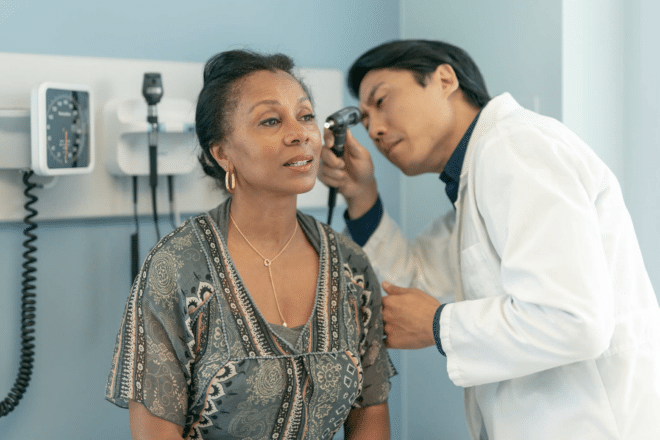Whether it’s a nagging tickling sensation or a painful burning, ear relief for itchiness and discomfort can be hard to come by unless you know why it’s happening. American Hearing Centers in New Jersey are committed to ear health and speak with many patients who bring up concerns about itchiness and discomfort when discussing hearing loss. What lies behind this irritating phenomenon? It could be for several reasons, but the good news is many are quite common and manageable with simple remedies and preventative measures.
Seasonal Allergies
As spring and summer roll in, so does the pollen count, often leading to seasonal allergies that don’t spare any part of your body, including your ears. Pollen is a fine powder produced by trees, flowers, grasses, and weeds to fertilize other plants of the same species. It’s critical in the reproductive cycle of plants, but it also happens to be a common allergen for people. When it enters the body, your immune system identifies it as a harmful intruder, triggering an allergic reaction. The body responds by releasing histamines to combat what it perceives as a threat, resulting in allergy symptoms, such as itching, swelling, and respiratory difficulties, including itchy ears. What can you do about it? Manage your allergies by:
- Keeping windows closed during high pollen days
- Considering an over-the-counter antihistamine
- Regularly cleaning your hair and body after outdoor activities
Skin Allergies
Did you recently try on new ear jewelry, use a different brand of headphones, or buy new shampoo only to find your ears inflamed? Itchy ears and their causes in such scenarios are often due to skin allergies, such as contact dermatitis. Triggers like nickel in jewelry, latex in earbud covers, or perfumes in soaps and shampoos can cause reactions. Determining the culprit can take a little detective work.
- Identify and avoid allergy triggers
- Use hypoallergenic products
- Apply topical corticosteroids if recommended by healthcare providers
Bacterial and Fungal Ear Infections
Ear infections are common and, along with itchy ears, can come with a host of other symptoms, including pain, discharge, and hearing loss. Bacterial infections cause inflammation and a buildup of pus-like fluid in the ear, leading to pressure and pain. The immune system’s response to the infection can also lead to swelling and further discomfort, often intensifying the itching sensation. Fungal ear infections, or otomycosis, happen when the naturally occurring fungi in the ear canal are overgrown, usually because of a warm, moist environment that fungi find ideal. The infection can cause itching, flakiness, and a discharge that resembles cotton wool in both look and texture. This type of infection is prevalent in individuals who use earplugs or hearing aids, as these devices can trap moisture and reduce ear canal ventilation. Seek medical attention when:
- You have persistent pain or itching
- Symptoms last more than a couple of days
- There’s the presence of discharge
Hearing Aids and Earbuds
Wearing earbuds or hearing aids for prolonged periods can create a warm, moist environment conducive to itching, even without a fungal infection. It can also cause pressure sores, which are another source of discomfort. If you wear hearing aids, speak with your hearing care provider about proper maintenance and cleaning of the device. Manage these symptoms by:
- Ensuring proper fitting of hearing aids
- Limiting time spent using earbuds
- Keeping devices clean and free of wax buildup
Over-Cleaning Your Ears
Contrary to instinct, frequent cleaning of your ears may do more harm than good. Over-cleaning strips your ear canal of natural oils, leading to dryness and itching. Sticking items like cotton swabs in your ear can also cause ear damage. For proper ear cleaning, follow these steps:
- Avoid using cotton swabs inside the ear
- Clean your outer ear with a damp cloth
- Seek professional cleaning if necessary
Earwax Buildup
Earwax is naturally produced and serves to protect your ears. However, when accumulated excessively, it can harden and cause an itching sensation within your ear. If you have excessive earwax buildup, seek help from an ear health provider to remove it safely.
Emotional Swings
Stress and anxiety can contribute to itchy ears. When we experience emotional highs or lows, our body responds with various physical symptoms, such as red cheeks and red, itchy ears. Try these methods to calm your emotions:
- Deep breathing exercises
- Regular physical activity
- Mindfulness meditation
Skin Conditions Like Eczema or Psoriasis
If you have an inflammatory skin condition, such as eczema or psoriasis, you’re likely aware that it can affect your ears just as it does other areas of your skin. Its manifestation might be flakiness, redness, or relentless itchiness. Management and self-care include:
- Moisturize with eczema-friendly products
- Use prescribed medicated creams
- Avoid irritants that may cause flare-ups
Consult With Ear Health Specialists
Itchiness and ear pain causes can be due to several issues, and if home remedies or over-the-counter options don’t work, contact American Hearing Centers in New Jersey. Untreated issues can lead to additional problems, including hearing loss. We have locations throughout the state and offer free hearing tests and evaluations if you’re experiencing issues that make hearing difficult.



